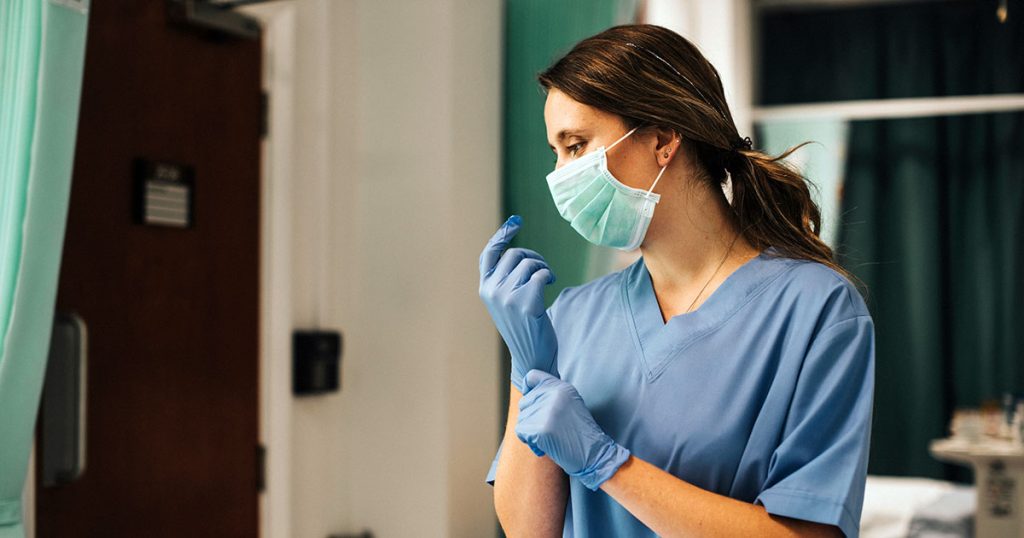Discover what nurses do to help surgical patients before, during, and after surgery.

Overview
Perioperative nursing is a specialised field of nursing, dedicated to caring for patients before, during, and after surgical procedures. Perioperative nurses form part of the surgical group, working closely with surgeons, anaesthetists, and other healthcare professionals. They prepare patients for surgery, assist during the operation, and provide postoperative care.
The field includes several key roles: anaesthetic nurses assist with the administration of anaesthesia and monitor patient vital signs; instrument nurses, also known as scrub nurses, handle surgical instruments and assist surgeons directly; circulating nurses manage the overall environment of the operating room; and Post Anaesthesia Care Unit (PACU) nurses care for patients recovering from anaesthesia.
While most perioperative nurses in Australia are registered nurses, enrolled nurses can also play a role. They may assist as circulating or instrument nurses, supporting the surgical unit under the guidance of registered nurses. Although each nurse has a specific role, perioperative nurses often have some clinical experience and/or training in other roles within the team.
Nursing Roles
Perioperative nursing in Australia consists of five categories of nursing roles. The surgical crew typically has one or more of each of these different types of specialists. Each perioperative nurse may work across one, two, or all three phases of perioperative nursing: preoperative, intraoperative, and postoperative.
1. Anaesthetic Nurse
The Anaesthetic Nurse prepares anaesthetic equipment and agents, assists the anaesthetist, and ensures patient comfort and safety during surgery. Anaesthetic nurses should have strong patient assessment skills and knowledge of anaesthetic methods and monitoring techniques. To meet Australian College of Perioperative Nurses (ACORN) requirements, registered nurses need postgraduate training, while enrolled nurses require a Diploma of Anaesthetic Technology.
Related: Role of an Anaesthetic Nurse in Australia
2. Circulating Nurse
The Circulating Nurse, or Scout Nurse, manages operating room activities, assists the sterile team, and ensures patient safety. They understand surgical procedures, manage intra-operative complications, and have technical skills in handling surgical instruments. RNs in this role usually undertake postgraduate training in intra-operative nursing. Enrolled nurses should have studied medication administration in their Diploma of Nursing.
3. Instrument Nurse
The Instrument Nurse, often called a Scrub Nurse, sets up sterile supplies and instruments, assists the surgeon, and maintains item counts. They monitor the sterile environment and ensure aseptic conditions, anticipating the surgeon's needs and supporting the surgical team. RNs should do postgraduate intra-operative training for this role, while enrolled nurses require medication administration knowledge.
4. Recovery Nurse
The Recovery Nurse (or Post Anaesthesia Care Unit (PACU) Nurse) oversees patient recovery from anesthesia. They conduct assessments and manage post-operative care, including pain management. RNs typically do postgraduate training for this role. Enrolled nurses, with a Diploma of Nursing and medication administration skills, may work in second-level recovery care.
5. Day Surgery Nurse
Day surgery and pre-admission nurses prepare patients for surgery, assess their readiness, and communicate important information to operating room staff. They listen to patients and collaborate closely with the surgical team to ensure safe patient outcomes. Both registered nurses and enrolled nurses with the appropriate training can do this role.
Related: Types of Nurses in Australia: Nursing Specialties
Salaries for Perioperative Nurses
A perioperative registered nurse earns an average of $86,861 per year or $43.81 per hour in Australia. Entry-level positions typically start at $72,118 per year, with earnings for experienced clinical nurses reaching up to $107,382 per year.
You may think that working in perioperative nursing, especially as an operating room or surgery nurse, would result in higher earnings. However, this is not necessarily the case, and the above figures are average nurse pay rates for Australia.
As a nurse, your salary increases with experience and as you qualify for specialist roles such as Clinical Nurse Specialist, Clinical Nurse Educator, or Clinical Nurse Consultant. You can achieve this as a perioperative nurse. However, generally, you don’t earn more or less by working in this specific area.
Related: Highest Paid Nurses in Australia (Ranked)
How to Become a Theatre Nurse
To become a Theatre Nurse, you'll need to complete a nursing degree and gain experience in surgical wards.
- Start by earning a Bachelor of Nursing. For those with a degree in another field, do a master's degree in nursing practice instead.
- Next, register as a Nurse with the Nursing and Midwifery Board of Australia (NMBA) and gain a year's experience as a Registered Nurse.
- Then, complete a postgraduate qualification, such as a Graduate Certificate in Perioperative Nursing.
Any registered nurse or suitably trained enrolled nurse is able to work in theatre and call themselves a theatre nurse. However, experience and relevant qualifications are needed to apply for roles beyond entry-level.
Related: Nursing Certification Programs
How Hard Is Perioperative Nursing?
Perioperative nursing can be one of the more challenging nursing roles because of the pressure of the operating room environment. However, it's important to remember that you're part of a team and have a specific job to focus on. Like any job, it becomes easier over time.
It's a task-oriented role, as most perioperative nurses have limited interaction with surgical patients, at least while they're conscious. Isabella, an operating room nurse, observed, "It requires less critical thinking... you're more focused on the things that you'll need for this patient's surgery to be successful."
A new perioperative nurse is on a significant learning curve. Initially, you might find the array of surgical procedures, the complexity of operating room protocols, and the pace of work daunting. As operating room nurse Alyssa Presley pointed out, "I worry a little bit if somebody were to go straight from school into the operating room that it would be so overwhelming that they would peace out."
However, you can expect to become more comfortable over time and achieve job satisfaction. Alyssa commented, "Being able to calm a patient has just been so rewarding for me... it's still giving me that fulfillment." Isabella exclaimed, "Seeing cool surgeries... sometimes it feels really rewarding... seeing kids have their cleft lip or palates repaired... it's such a beautiful thing."



